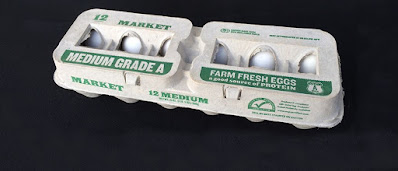When you walk to/past the egg aisle at the grocery store, there are probably at least a hundred dozen eggs from various farms, all with different labels and captions. As with many things in today's society, information overload is also very prevalent among food. Don't get me wrong, variety within food is good, but I think that there is too much variety when it comes to labeling particular foods, like eggs and meat. This leads to a consumer that feels good about buying the most expensive egg with the most labels, but not really knowing what separates the cheap eggs from the expensive eggs.
First, let's start with the largest category of eggs.
When you hear "caged-eggs," chances are, you might envision a picture of a dark barn with pale, rough looking chickens that are stacked on top of each other in dirty cages. If you've ever watched any animal-rights activist videos about egg farms, that's probably where you get that image from (however, notice that those videos rarely mention the location/name of the farm they are "visiting.") Needless to say, I am sure that there are caged-egg farms in the U.S that have rough looking hens (probably at the end of their egg-laying cycle) in dirty barns. I also know that there are caged-egg farms in the U.S that don't come anywhere close to the description above. It all hinges on the (a) standards and regulations on egg production, and (b) the personality of the farmer. Some farmers like running a dirty farm, while others like keeping a clean farm...and of course, the clean farms are the ones that bring the most and the best quality of their product to the table. Another thing to keep in mind is that the standards for American food production are levels above a majority of countries, where standards are minimal/non-existent. While I'm not advocating for more regulations and rules, (when correctly implemented and maintained) they help keep a standard of accountability (because people would rather be unaccountable and un-responsible), which is especially important when dealing with food.
How do I know what eggs are from caged-egg farms?
You would be hard pressed to find an egg carton that says that "this egg was produced on a caged-egg farm." Essentially, look for the egg carton that doesn't have any fancy labels, like the one below.
The reason why cage-eggs are going to be simply-labeled is because there isn't really a lot to say about them. In other words, they are a good source of protein for the lowest price.
I like to think of cage-eggs as the foundation of the building, which is modern egg farming. Every brick (egg labels) that is on top of that foundation is separated a little from the foundation, but it still is part of the big picture called "eggs."
Stay tuned for next week's post on cage-free eggs! As always, any questions or comments are always welcomed!




Comments
Post a Comment